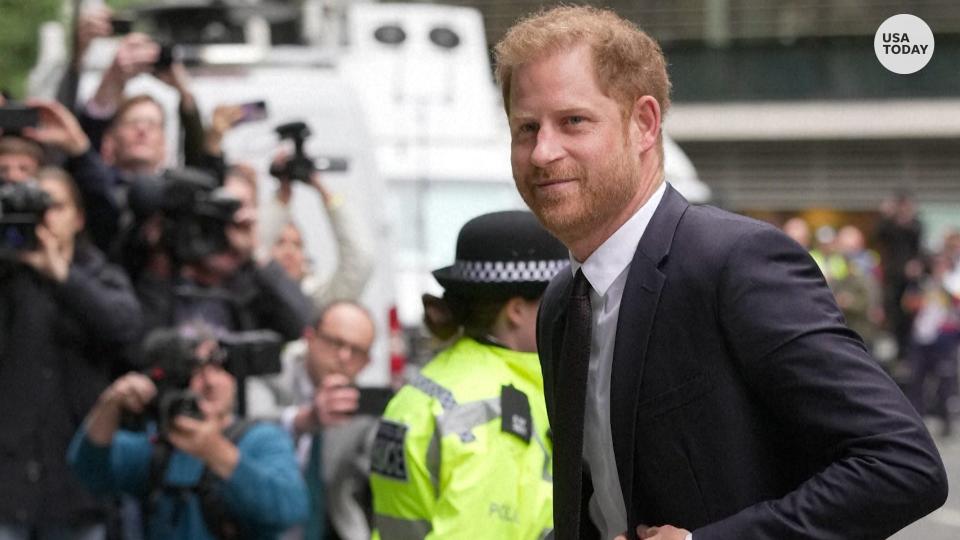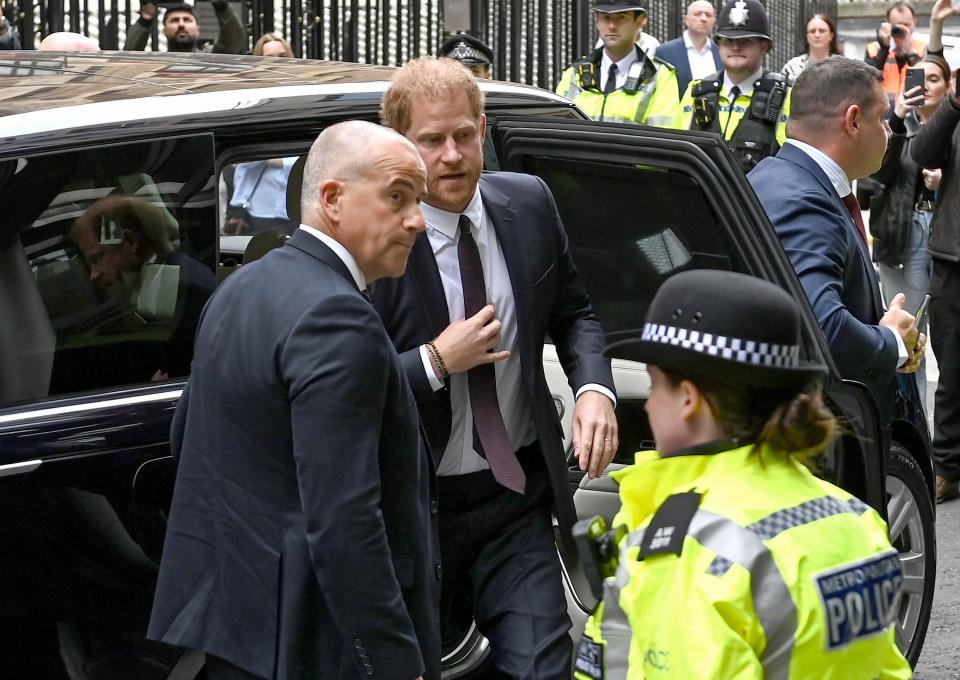Prince Harry continues testimony in court: 'Phone hacking was at an industrial scale'
Prince Harry entered a London courtroom on a mission to prove that the publisher of the Daily Mirror tabloid had hacked his phone and unlawfully snooped on his life.
He left the witness box Wednesday having shown that he was highly suspicious of how Mirror Group Newspapers obtained information for stories about him, but without offering phone records or much other evidence to support his hacking claim.
"I believe that phone hacking was at an industrial scale across at least three of the papers at the time," the Duke of Sussex asserted in his second day of testimony in London's High Court. "That is beyond any doubt."
Phone hacking is central to his case against Mirror Group and two related lawsuits against other British tabloid publishers that he claims invaded his privacy by eavesdropping on emails and using other illegal methods to report on the smallest details of his life, causing him great emotional turmoil.
Harry is the first senior member of the royal family to testify in court in over 130 years, and his high-stakes gamble in taking his cases to trial is unprecedented in modern times.

Why is Prince Harry in court?
Harry has five active lawsuits that are directly related to the safety and privacy of his family.
The suit being heard in London's High Court – brought by Harry and other celebrities – alleges that between 1996 and 2011 the Mirror as well as The Sun and Daily Mail hacked into phone voicemails in order to access private information.
Harry believes reporters used burner phone and destroyed records and that there's been a cover up of the hacking scandal. "Finding out about this level of cover up is what makes me want to see my MGN claim through to the end, so people can really understand what happened," he testified Wednesday.
The prince's testimony kicked off Tuesday.
What to know on Prince Harry's lawsuits From phone hacking to aerial photos
What Prince Harry said during testimony on Day 2
In addition to Prince Harry's desire to hold the newspapers accountable for a "destructive" role in his life and what he said was a cover-up of the hacking scandal, the pursuit indicates the seriousness of his larger mission to reform the press.
"Finding out about this level of cover up is what makes me want to see my MGN claim through to the end, so people can really understand what happened," he testified.
During cross-examination, Mirror Group attorney Andrew Green pressed the prince to explain which elements of articles had come from hacking and how he could prove it without providing call data.
Harry insisted that parts of certain stories were suspicious and said Green should consult the reporters who wrote the articles about what they did. He said reporters had used burner phones and destroyed records.
Green, who has said Harry's phone was not hacked, asked if Harry would be relieved or upset if the judge reached the same conclusion.
"To have a decision against me … given that Mirror Group have admitted hacking, yes, it would feel like an injustice," Harry responded.
"So you want to have been phone hacked?" Green said. "Nobody wants to be phone hacked," Harry replied.

Harry's suspicions of the press run deep. He questioned not only whether unnamed sources were real but also whether people quoted by name had actually said the things attributed to them.
More than once, he said that seeing something in print attributed to someone "doesn't mean that it's true" and said false information was added to stories "to put people like myself off the scent."
Green asked if he really thought that journalists would be foolish enough to risk getting caught phone hacking after a News of the World reporter and a private investigator went to prison for such activity in 2007.
"I believe the risk is worth the reward for them," Harry answered.
Green has apologized for the one instance Mirror Group has admitted to hiring a private investigator to dig up dirt on Harry, though it was not among the claims he has brought. Mirror Group denies or doesn't admit his other allegations.
Prince Harry says articles caused 'distress' on the stand during Day 1
Prince Harry first took the stand Tuesday, opening up about the "distress" media had caused him through his life.
Harry told Mirror Group attorney Andrew Green he had "experienced hostility from the press since I was born." The prince accused the tabloids of playing "a destructive role in my growing up."
Green pressed him on how the articles could have caused such distress if he couldn’t remember having read them at the time.
"It isn't a specific article; it is all of the articles," he said. "Every single article has caused me distress."
In his witness statement, Harry claimed that during his adolescence and young adulthood, tabloids cast him in a role — "the 'thicko,' the 'cheat,' the 'underage drinker,' the 'irresponsible drug taker.'"
Harry alleged that journalists' behavior damaged his mental health, spurring "bouts of depression and paranoia … I now realize that my acute paranoia of being constantly under surveillance was not misplaced after all."
DAY 1 OF ROYAL TESTIMONY Prince Harry testifies in phone hacking trial: 'Every single article has caused me distress'
Prince Harry is the first royal to testify since King Edward VII in the 19th century
Harry, the 38-year-old younger son of King Charles III, is the first senior British royal since an ancestor, the future King Edward VII, appeared as a witness in a trial over a gambling scandal in 1891.
Harry has said the royal family avoided legal entanglements to prevent having to be put in the witness box.
His case dates from 1996 to 2011 – a period when phone hacking by tabloid journalists was later discovered to have been widespread. The scandal led to revelations of more intrusive means such as phone tapping, home bugging and using deception to obtain flight information and medical records.
Harry’s fury at the U.K. press runs through his memoir, "Spare." He blames paparazzi for causing the car crash that killed his mother, and said intrusion by the U.K. press, including allegedly racist articles, led him and his wife, Meghan, to flee to the U.S. in 2020 and leave royal life behind.
Mirror Group has paid more than 100 million pounds ($125 million) to settle hundreds of unlawful information-gathering claims, and printed an apology to phone hacking victims in 2015.
Contributing: Morgan Hines, Marco della Cava, USA TODAY; Brian Melley, The Associated Press
This article originally appeared on USA TODAY: Prince Harry testimony: What he said in court for tabloid lawsuit
